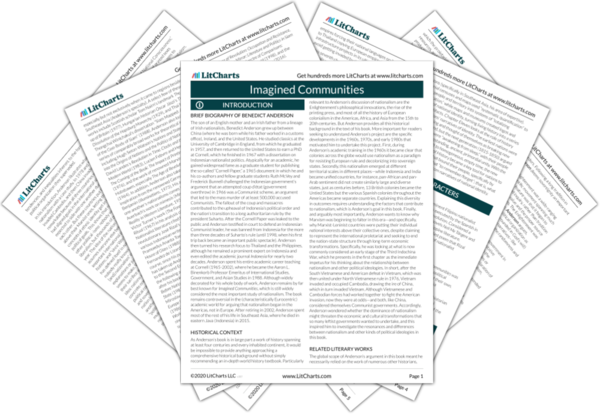The Nation as Imagined Community
Benedict Anderson’s most enduring scholarly contribution remains the succinct but revolutionary definition of the nation he offers in the introduction to Imagined Communities: a nation is “an imagined political community—and imagined as both inherently limited and sovereign.” This definition is radical because it presents a transformed understanding of the kind of thing a nation is—Anderson claims that it is an idea that binds people, not a natural political unit. At the same…
read analysis of The Nation as Imagined CommunityLanguage, Publishing, and Identity
As he traces the rise of the nation-state throughout history, Anderson continually returns to language, literacy, and publishing technology as key factors that allowed people to imagine themselves as members of communities and then claim political identities and rights based on those communities. He shows how the spread of common languages allowed people to see their shared interests and, eventually, organize revolutions. And he concludes that, because dialect can stand in for identity and publishing…
read analysis of Language, Publishing, and IdentityCentralization, Technology, and Power
Anderson argues that contemporary nations have been profoundly shaped by the unique means by which they can project power. Nationalism’s rise both coincided with and further encouraged endless advancements in technology, the spread of capitalism around the globe, and governments’ rapid expansion through bureaucracy. These structures of power make modern states’ sovereignty unprecedentedly strong and yet also paradoxically more diffuse, since they’re supposedly run by the people on their own behalf rather than by and…
read analysis of Centralization, Technology, and Power
Piracy and the Uses of History
Anderson emphasizes that nationalism has taken diverse forms as a result of differences in culture, historical changes in technology and markets, and perhaps most of all, the availability of historical precedent. Anderson highlights this last factor, which he calls “piracy,” because it has been relatively underemphasized in scholarly work on nationalism: after nationalism’s birth in the Americas, the rest of the world followed suit in converting monarchies and colonies to nations, but they envisioned what…
read analysis of Piracy and the Uses of History






